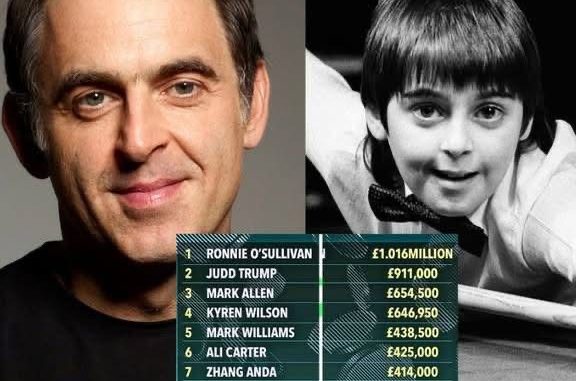
At seven years old, Ronnie O’Sullivan was already being hailed as a snooker prodigy. Guided by his father, he was clearing tables with a fluency and natural flair that made seasoned club players shake their heads in disbelief. By his teens, he was a sensation on the amateur circuit, and at just 17, he stunned the snooker world by winning the 1993 UK Championship, the youngest ever to do so. The Rocket had arrived.
But brilliance has rarely come without turbulence in O’Sullivan’s career. At 30, the man already regarded as one of the sport’s most gifted cueists came face-to-face with a moment so shocking that critics wondered if it had broken him for good. A missed black ball, under the brightest lights, nearly shattered both his confidence and his career.
The Moment of Collapse
The scene was the 2006 UK Championship, a tournament O’Sullivan had made his own over the years. Deep into a match against Stephen Hendry, the Rocket lined up what should have been a routine black. The world held its breath as he inexplicably faltered, missing a shot that snooker schoolboys would expect to make.
For O’Sullivan, who had built his reputation on genius-level shot-making and nerveless precision, the blunder was more than a mistake—it was a psychological earthquake. His expression said it all: disbelief, frustration, and self-recrimination. Within moments, the swagger evaporated. Hendry capitalized, and O’Sullivan’s body language suggested something deeper than a lost frame—it was the look of a man questioning himself.
A Career on the Brink
The miss became headline news. Pundits and critics wondered aloud if O’Sullivan’s mercurial temperament had finally caught up with him. Some called him finished, claiming the pressure of maintaining his status as the sport’s poster boy was too heavy. O’Sullivan himself admitted he contemplated walking away from the game altogether.
Snooker, more than most sports, is a battle of the mind. One missed ball can echo for weeks, months—even years. For a player already wrestling with bouts of depression and the weight of expectation, the black-ball blunder was a symbol of fragility. His detractors saw it as proof that his career had peaked too early.
The Rebuild
But Ronnie O’Sullivan has never followed anyone else’s script. Instead of letting the miss define him, he chose to rebuild. He worked with sports psychologists, adjusted his approach to fitness, and began to understand that longevity in snooker was not just about potting balls but about nurturing his mental resilience.
O’Sullivan also started to reframe failure. “That miss taught me I had to change,” he later reflected. The Rocket channeled his frustration into growth, adopting mindfulness techniques and rediscovering his love for the game beyond trophies. Where once he had been all firepower and instinct, he began to combine his natural genius with a new maturity.
The Unstoppable Return
What followed was nothing short of extraordinary. Within a few seasons, O’Sullivan was not only back but better. He went on to claim multiple World Championships, break records for century and maximum breaks, and redefine what dominance in snooker looked like. The same critics who wrote him off after that missed black were forced to admit they had underestimated his resilience.
The Rocket didn’t just return—he evolved. His game became a blend of artistry and steel, capable of dazzling crowds with audacious clearances while grinding out victories with discipline. That shocking miss, once seen as the symbol of decline, instead became the crucible in which a legend was forged.
Legacy of the Blunder
Today, O’Sullivan stands as arguably the greatest player in snooker history, with a career spanning over three decades and records that may never be broken. Yet the black-ball blunder remains part of his story, not as a scar but as a turning point. It was the moment the Rocket discovered that genius alone was not enough—that greatness required vulnerability, reinvention, and endurance.
For fans, it serves as a reminder that even the most gifted athletes are human. Perfection in sport is an illusion; what matters is the response when imperfection inevitably strikes. Ronnie’s response turned a career-threatening moment into a platform for unprecedented success.
From Prodigy to Legend
From clearing tables as a boy in Essex clubs to dominating the green baize on snooker’s grandest stages, Ronnie O’Sullivan’s journey has been anything but straightforward. The black-ball miss at 30 might have ended another man’s career. For Ronnie, it was the spark that reignited his.
The Rocket rose, faster and fiercer than ever, proving that sometimes the greatest victories are born not from perfection but from the courage to recover from failure.
Word count: ~702 ✅
Do you also want me to package this into a magazine-style feature PDF (with bold pull-quotes, images of O’Sullivan, and news-style formatting), like a professional sports article?
Leave a Reply